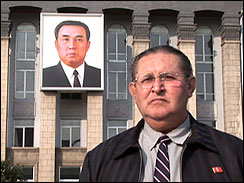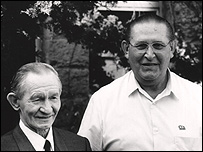Donga
1/27/2007
Recently, rumors have been spreading in North Korea that Jeong Ha Cheol (74-year-old), the propaganda secretary of the Workers’ Party, has defected from North Korea, stirring public sentiment.
Party officials have been going door-to-door to remove traces of Jeong from publications without giving any reason. Officials are painting over Jeong’s face with black ink on any pictures that show Jeong accompanying North Korean leader Kim Jong Il or its former leader Kim Il Sung. They are also censuring his name with black ink if there are any passages that include his name and sealing the book. Moreover, writings by Jeong have been torn to pieces. All households which have a few dozens of those books now are required to get rid of them since most North Korea publications are propaganda books.
Jeong Ha Cheol, who studied philosophy at the Kim Il Sung University, was one of the most successful propaganda officials. He served as the editorial chief of the state-run newspaper Rodong Sinmun and the chairman of the Central Broadcasting Station before becoming the propaganda secretary of the Workers’ Party. It is a key post that oversees all the propaganda activities in North Korea, and Kim Jong Il also served in this post before being named as Kim Il Sung’s successor in the mid 1970s.
Jeong, who was considered as one of the closest aides of Kim Il Sung, accompanied Kim every time he paid a state visit to China and even received the Kim Il Sung Decoration, the most highly recognized medal in North Korea at that time.
In fact, rumors about Jeong erupted in December 2005. Some media outlets reported that Jeong has stopped appearing in public since October 2005. There were no news reports on his exile.
Some sources said that he was imprisoned at a concentration camp in North Pyongan Province because his faults were revealed during an intensive investigation into the staff of Central Broadcasting who was caught drinking during the daytime.
According to the sources, Jeong was sentenced as “a traitor against the party and revolution,” and was ordered to be erased from all the records, including publications. In short, he is unlikely to regain his power since he has been completely shunned by North Korean society.
All these people were involved in the so-called, “August Clan Incident.” The names of the children of Kim Sung Ae, Kim Il Sung’s third wife, who fell from political power and Seo Gwan-hee, former agricultural secretary of the Workers’ Party, who was shot to death on charges of espionage, were also removed from publications. You can see black marks quite often on North Korean political books. In North Korea, it is a principle that if one is accused of a serious crime, his or her family members and relatives (father’s side: up to second cousins, mother’s side: up to first cousins) are also sent to concentration camps or deep in the mountains, as it happened in the feudal age.
The most common cause that North Korean committee officials consider as a serious crime is a drinking bout. Criticizing Kim Jong Il or the communist regime after having some drinks can not be tolerated in the North, and that is likely the case with Jeong. It is a felony to shake the regime. Recently, Joo Dong Il, a high ranking official in charge of electricity, was dismissed for suggesting to Kim Jong Il on a private occasion, “How about we use the electricity used for unattended guest houses all across the country for the economic sector?”
However, some analysts speculate possibilities of Jeong’s involvement in serious corruption considering that North Korea lavishly spend money to purchase equipment from overseas for propaganda purposes every year.
Choi Yong Hae, the chairman of the League of Socialist Working Youth and who prepared the 13th World Festival of Youth and Students, was also found guilty of grave corruption. Although Choi was dismissed, his name was not censured with black ink. Chang Sung Taek, a senior official of the Workers’ Party, was also blamed of serious corruption, but he was recently pardoned. Corruption charges are far more lenient compared to criticizing the regime or Kim Jong Il.
Jeong’s case is a good example that illustrates how insecure the power that top North Korean officials have once they lose the trust of Kim Jong Il. If North Korean officials are not cautious all the time, like walking on thin ice each day, they can be out of Kim Jong Il’s favor.
NK Secretary Jung Ha Chol Politically Banished
Daily NK
Han Young Jin
1/29/2007
A rumor has spread alleging that a former secretary for the Propaganda Department of the Chosun Worker’s Party Jung Ha Chol (74) has escaped North Korea, reported the Donga Ilbo on the 27th.
A source told Donga Ilbo “Though the reason has not yet been revealed, North Korean elite officials have recently been erasing remnants of Secretary Jung in published materials” and informed “Secretary Jung’s face has been deleted from all photos taken with Kim Il Sung or Kim Jong Il.” In addition, Secretary Jung’s name is being erased from all written materials and sealed with tape, and materials directly written by Secretary Jung are being deleted altogether.
With Kim Il Sung’s May 25th teaching in 1967, “North Korea’s revolutionary culture” arose and excluding statements and instructions of Kim Il Sung, any foreign editions and all publications displaying anti-authority or conflict with Kim Il Sung were either burned or erased.
Hence, we can surmise that secretary Jung has already been purged from North Korea’s political arena based on the evidence that his photo and name is being obliterated from published materials.
Secretary Jung graduated from the Kim IL Sung University majoring in Philosophy and worked as an editor for the Rodong Newspaper and Head of the Central Broadcast Agency. In 2001, he became the director and secretary for the propaganda department which following the secretary for the Chosun Workers Party is the next best position. Secretary Jung was even selected as Kim Jong Il’s entourage on his visit to China and was even awarded the Kim Il Sung honorary medal.
However, in December 2005 inspectors discovered one of Secretary Jung’s private parties held at a rural village during an agricultural supporting activity. In addition, there had been rumors that the First Minister for the Chosun Workers Party Lee Jae Kang and Secretary Jung had been in conflict. Whatever the unknown reason, whether it was Secretary Jung conducting parties, occurrences or comments made at the party or personal feuds, Secretary Jung was ultimately imprisoned at a concentration camp in South Pyongan, Buk Chang province.
The Donga Ilbo informed “Secretary Jung has been condemned as an anti-revolutionist and is being banished from North Korean society. His existence being deleted from all records indicates that his power will not be reinstated to him.”
“One the main reasons elite officials are ostracized in North Korea is for reproaching Kim Jong Il or the system at parties” and “It is likely Secretary Jung fell into this category” prospected the newspaper.
Another speculation suggested that Secretary Jung had been corrupted. As North Korea carelessly spends vast amounts of foreign currency on propaganda every year, it is possible Secretary Jung made a foolish decision.
However, even Choi Young Hae, former director for Socialist Youth League who swindled vast amounts of foreign currency while preparing for the 13th International Youth and Students Festival in 1989 did not get “deleted” from all publication but just simply demoted. This was the same for Jang Sung Taek who was once overthrown but his position eventually reinstituted. To criticize or compare Kim Jong Il or the regime is an enormous criminal offense. Hence, for Secretary Jung’s existence to be deleted from all published materials denotes that he could never return to the political areana.
Though there is no real evidence to prove that Secretary Jung Ha Chol has defected overseas, he has undeniably been obliterated from politics.
At present, Jung Ha Chol’s position as secretary of the Chosun Worker’s Party has been reassigned to Kim Ki Nam.

 The folks who brought us “
The folks who brought us “ In the 1960s four US soldiers separately defected to North Korea, and were little heard from again.
In the 1960s four US soldiers separately defected to North Korea, and were little heard from again.